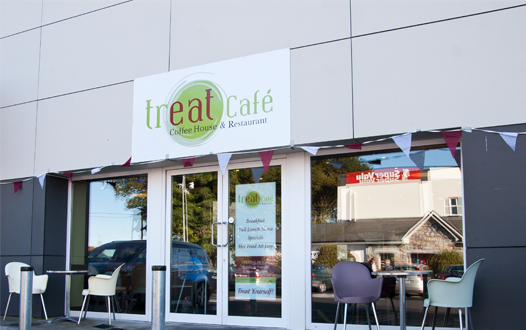The taximan drove in silence, and George certainly didn’t feel like small talk. They kept to minor roads, and were very shortly out of George’s familiar surroundings and driving through villages and small settlements, up and down mountains, hugging forested precipices and sudden clear drops where a river flashed in the depths. If he had been in a receptive mood, the passenger would have enjoyed the scenery: the blue-grey Appenines, furred by forestry, the folds like flesh-folds of huge animals, the fur still flecked with snow. But on this particular trip, the animal appearance of the mountains only fuelled his baleful fantasies.
Time passed, and they were down on the level again, on a windswept plain. On one side of the road deserted villages clung to slopes of rocks, ghostly white walls with eyeless dark of windows, decayed buildings, abandoned homes, villages of the dead, of vampires, of werewolves. The mountains now lay like huge animals in folds of flesh on the other side of the plain. The car was shaken and buffeted by the wind, the roaring wind that blew in this huge, desolate space.
‘Where you from?’ the driver barked suddenly, shaking George out of his melancholy. When he looked for some sign of engagement, however, the taximan was eyeing the road intently as if he was driving through fog, as if he had never spoken.
‘I said where you from? Why you not answer?’
‘I’m from Ireland,’ George volunteered meekly. ‘But I have been living in…’
‘Why you come here?’
‘I needed a break.’
‘You need a brek? Why you come here if you need a brek? Why you need this brek?’
‘From writing.’
The driver took his eyes off the road, looked at his passenger for the first time since the journey began. ‘You is writer. You need a brek. And you come here.’ He emitted a dry, cracked laugh.
‘I’m sorry now that I ever came.’
‘Is too late.’
There was a long silence. They were beginning to ascend again, and now the driver had good reason to squint intently at the road, because the sun, about to go under, was glaring blindingly down from the rim of a mountain. It was dark by the time he spoke again.
‘There was a writer, inglese, I knowed him. He come here. He go fucking crazy.’ The driver touched his temple with a middle finger. ‘He go fucking crazy, like you.’
‘I’m not crazy.’
‘Yes you is. You is fucking crazy. Why you come here if you not crazy? Why you want a brek? What is problem? Problem is you is crazy, then you come here, you is more crazy.’
‘That’s about the size of it,’ murmured George. ‘Professor Piero could not have put it better,’ he added, to himself rather than to the driver.
‘Professor Piero,’ the taximan said with a tone of resigned contempt.
‘You know him?’
‘Yes, I know him. He also crazy.’ Finger to the forehead again. ‘He serious crazy. He dangerous. Now I see why you is crazy. You go to Professor Piero. Why you go to Professor Piero?’
They were speeding downwards. The tyres ratcheted sickeningly against the rim of the road. George caught a glimpse in the headlights of a yawning drop.
‘Will you slow down?’ he shouted, his anger spurting through at last. ‘Who the hell are you, anyway? Why are you asking me all these questions? It’s really none of your fucking business.’
‘You want me slow down? I slow down. Is all right. We nearly there. Calmo, calmo. But why you go to Professor Piero?’
‘The dogs brought me to him. Maybe you know the dogs, too, since you seem to know everything. And maybe you know Tessa. And Rogero and Mathilde. And maybe you know that I was sexually abused as a child, by my uncle.’
‘Yes, I know everything. They all crazy. Rogero, Tessa, Mathilde, Professor Piero. They all serious pazzi. You bet they is crazy. Like you. Maybe the dogs not crazy – it not matter. You uncle, maybe he crazy, but he not fucking you. No sesso. Is all in you head, because you crazy. Is so simple. Why you blame you uncle because you is fucking crazy? But we here.’
The car screeched to a halt. George could see nothing in the headlights but a grass margin and trees.
‘I leave you here,’ said the taxi driver. ‘Is maybe two, three kilometers on sentiero, liddle road. It go up, up, up. Soon you see fire. Follow fire.’
‘I can’t see anything.’
The driver slapped his forehead in frustration, started the engine, reversed furiously, lurched forward and stopped again. A narrow path between the trees appeared in the headlights.
‘Get out, please.’
George got out, suddenly changed his mind, lunged at the taxi driver, grabbing him by the lapels of his jacket and bringing his face up close to his own.
‘Who are you?’ he demanded. ‘You better tell me, because I’ve had enough shit from you in a few hours to last a lifetime. Who are you?’
The taximan placed a hand on one of George’s tightly gripping knuckles. He recoiled at the touch, as if electrified.
‘It not matter,’ the taximan said, adjusting his jacket. ‘I bring you where you need to be, is all. Now I go. Now you go on liddle road. Up, up, up. Soon you see fire. Follow fire. You crazy. Soon maybe you is more crazy, or maybe you not crazy any more. In bocca al lupo, best of lucks.’
George watched the headlights of the car until they disappeared. As if on cue, a crescent moon came out from behind the clouds and gave him enough light to begin his ascent.
From A Year's Midnight, Ciaran O'Driscoll, Pighog Press 2012
www.pighog.co.uk/titles/a-years-midnight.html
.JPG)









